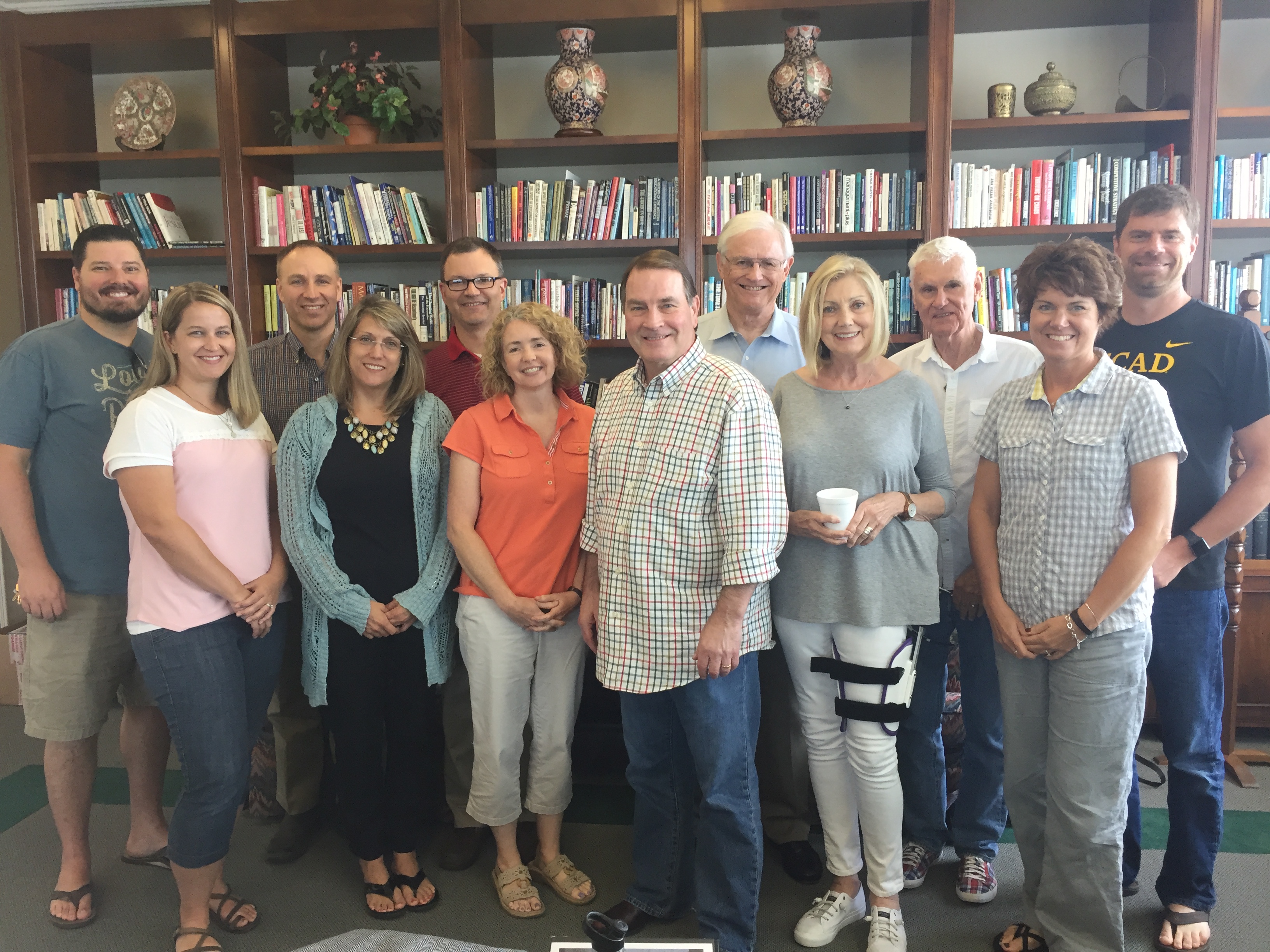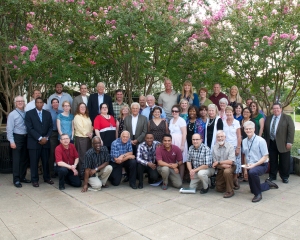
Lorie Ammon
Imagine how inspiring it could be to meet someone whose approach is creative and innovative but grounded in the basics. Lorie Ammon is such a person. She takes you back to the basics of building intimacy in marriage. But she does it in a group setting, yet without embarrassing anyone. Her educational approach equips everyone with what they need to know. Then she challenges everyone to practice in the privacy of their home. She has found material to use that helps you make relevant application of biblical principles, yet it’s not a “Bible study” per se. It’s about how you do it. I supervise Lorie and can testify that she walks what she talks as is apparent in her own marriage. Could you marriage use a shot of increased intimacy? Consider what she has written:
Sitting in a circle together with several couples participating in the newest marriage program, I found myself feeling distressed by the continued struggle in the group. One husband epitomized the struggle. A bright and good-looking man with a loving and attractive wife, beautiful children, and a successful business had figured out all the major issues in life save one. In a heartfelt and exasperated tone he commented, “I never thought married life would be so hard.” I empathized with his struggle but I felt disheartened that our group had not brought him any hope. The image of my friend’s beleaguered face never left me as I pursued training as a professional counselor. As a new LPC intern, I was determined to help couples navigate toward a genuine loving bond, having had the experience in my own marriage that ‘happily ever after’ is not born from commitment alone but from vulnerable sharing of emotional needs. With this predilection my supervisor wisely affirmed my direction to pursue training in Emotionally-focused Couple Therapy. That was a year ago, and I can say it has been a satisfying investment with consistently fruitful results in 7 out of 10 couples I have had the privileged of working alongside. What was missing to help the husband in our group setting was understanding how to find the way back toward emotional closeness with his wife. I believe now this is the hard part, the pain people get into when they cannot reach their partner to restore a loving connection. Just as the infant cries for nourishment, so too, our hearts scream for connection.
Emotionally-focused Couple Therapy (EFT) has de-mystified my own experience in marriage by explaining the ruptures in emotional connection though the lens of Attachment Theory. Over fifty years ago, John Bowlby introduced this Attachment theory to the British Psychoanalytical Society in London with little receptivity. However, today it has been described as the dominant approach to understanding early social development in infants based on the secure emotional attachments they form to familiar caregivers, especially if the adults are sensitive and responsive to the child’s communications. The embrace of attachment theory to EFT was brought together by the research of Dr. Sue Johnson, the author of Emotionally-focused Therapy. EFT proposes and rightly, I believe, that the need for secure emotional attachment never disappears but evolves in the adult as a drive for a secure emotional bond with a partner. This attachment need is met by the interactions with a partner that convey a belief that they will respond when you call, that you matter to him or her, that you are cherished, and that he or she will respond to your emotional needs. This hard-wired need for emotional responsiveness from significant others is originally visible in the way a mother lovingly gazes at her baby, and yet again in the interaction of new couple who stare lovingly into each other’s eyes.
 We all can remember how our relationships began with that exhilarating feeling of intense closeness to our partners. Our attachments are so powerful that our brains code them as “safety.” But our attention can wane as life happens. Any perceived distance or separation in our close relationships is interpreted as danger because losing the connection to a love done jeopardizes our sense of security. This experience of distance sets off an alarm in our amygdala—the fear center of the brain, shutting off our prefrontal cortex that negotiates our safe emotional closeness again. A primal fear is set off, once the amygdala is activated, and we react without reason but instinctual action. This fight-or-flight response is what Sue Johnson says occurs in relationships where people are either angry with one another or are withdrawing in response to a perceived challenge to their sense of attachment. This is a normal response of attachment when we lose contact with each other. Problems arise by how we react after a time of disconnection, setting the relationship off in a downward spiral. Most couple difficulties can be traced to one or both not feeling the “safety.” The spiraling down leads to inappropriate attempts to elicit the reassurance that the other is really there for them. When the trouble in a relationship can be understood as being trapped in this cycle, we can begin to address the normal drive for attachment. The attachment drives ask questions such as, “Are you there for me?” “Can I count on you?” and “If I call, will you come?” EFT explains how attachment needs get distorted and misinterpreted, leaving each partner without a connection. How can they get out of this trap and reconnect?
We all can remember how our relationships began with that exhilarating feeling of intense closeness to our partners. Our attachments are so powerful that our brains code them as “safety.” But our attention can wane as life happens. Any perceived distance or separation in our close relationships is interpreted as danger because losing the connection to a love done jeopardizes our sense of security. This experience of distance sets off an alarm in our amygdala—the fear center of the brain, shutting off our prefrontal cortex that negotiates our safe emotional closeness again. A primal fear is set off, once the amygdala is activated, and we react without reason but instinctual action. This fight-or-flight response is what Sue Johnson says occurs in relationships where people are either angry with one another or are withdrawing in response to a perceived challenge to their sense of attachment. This is a normal response of attachment when we lose contact with each other. Problems arise by how we react after a time of disconnection, setting the relationship off in a downward spiral. Most couple difficulties can be traced to one or both not feeling the “safety.” The spiraling down leads to inappropriate attempts to elicit the reassurance that the other is really there for them. When the trouble in a relationship can be understood as being trapped in this cycle, we can begin to address the normal drive for attachment. The attachment drives ask questions such as, “Are you there for me?” “Can I count on you?” and “If I call, will you come?” EFT explains how attachment needs get distorted and misinterpreted, leaving each partner without a connection. How can they get out of this trap and reconnect?
The first step over of the dis-connection is to be aware of the trap that perpetuates emotional distance. Once a couple can identify they are trapped in a pattern of arguing and distancing they can agree to step out of the trap. With a dose of empathic understanding about their attachment needs, couples can take a leap of faith toward vulnerable sharing and reach toward each other for re-connection. This hope in reaching for emotional closeness is that their partner will be there and respond with a welcomed reconnection
Convinced by EFT’s demonstrated success, I will be initiating the first Emotionally- Focused Couples Groups in North Texas. After extensive training from the leaders in EFT from Houston to Chicago, I want to benefit Big D with a proven successful couple’s therapy. Being zealous for couples to experience emotional closeness, I have united my group psychotherapy training from the American Group Psychotherapy Association with EFT, to offer the first EFT group counseling setting for relationship enhancement. Couples groups are forming to build “Conversations for Connection” that will join for 8 weekly sessions. Each group meeting will be based on the Seven Conversations of Connection*:
1) Recognizing Demon Dialogues – First, couples identify common emotional reactions that lead to negative cycles in order to step out of them.
2) Finding the Raw Spots – Next, each partner learns to look beyond immediate, impulsive reactions to discover the vulnerable feelings under the negative cycles.
3) Revisiting a Rocky Moment – This conversation develops a safe platform for de-escalating conflict, repairing disconnections, and building emotional security.
4) Hold Me Tight – Now the partners can move into being more accessible, emotionally responsive, and deeply engaged to strengthen and protect their emotional connection.
5) Forgiving Injuries – Old emotional hurts can block intimacy and a secure connection. Knowing how to identify these injuries and offer and accept forgiveness empowers couples to strengthen their bonds.
6) Bonding Through Sex and Touch – Here, couples learn more about how emotional connection enhances physical connection, which in turn creates deeper emotional connection – the best kind of cycle.
7) Keeping Your Love Alive – The last conversation in the program builds on the understanding that a love relationship is a continual process of losing and finding emotional connection; it helps couples to be deliberate and mindful about maintaining that connection.
 *Based on Dr. Sue Johnson’s Book, Hold Me Tight: Seven Conversations for a Lifetime of Love. Emotion Focused Therapy is now research proven to be the leading theory for couple’s therapy.
*Based on Dr. Sue Johnson’s Book, Hold Me Tight: Seven Conversations for a Lifetime of Love. Emotion Focused Therapy is now research proven to be the leading theory for couple’s therapy.
This Group format will demonstrate conversations for connection to help unravel the mystery of love and see what helps couples strengthen their emotional bond with one another. We will explore building more trust and safety with each other. Often this leads couples to find a way to problem solve without arguing, and stand up for themselves without being defensive. You can learn what drives the repetitive negative pattern you get caught in, what you and your partner really need from each other, and how to have conversations that create lasting change and connection.
The group setting will involve sharing of ideas, and viewing real video clips of genuine couples demonstrating conversations for connection that unravel the mystery of what helps couples strengthen their emotional bond with one another. It is always up to you whether or not to speak up in the large group setting, for some, having the chance to share with others enhances their experience. You will have practice exercises with your partner (privately) to improve relationship skills. You are encouraged to read Hold Me Tight before the workshop. This book has been endorsed by leading researchers and authors in the marriage and relationship field. Couples of all backgrounds, and stages of life are welcome.
Contact Information: Lorie Ammon at (817)405-9127 or email lorie@graceadvocates.com. The cost for the group meetings will be $400 per couple for the entire eight 90 minute sessions. Each group is limited to only 5 Couples to insure a maximal group experience.





 Posted by leejagers
Posted by leejagers 

 The issue of transgender identity polarizes opposing camps so vigorously that we seem to prefer warfare and judgment rather than understanding and compassion. Everybody’s yelling and no one’s listening. Everyone is right and everyone else is wrong. Most people take a hard position defending their conclusions and no one is learning anything. I am concerned about the stagnation that this polarization creates. How do we soften the impasse that locks up human dialog, as though listening might cause us to compromise our most fundamental beliefs? We tend to hurl critical stereotypic slogans across a chasm of division emphasizing the virtues of our own position along with the disastrous aspects of those who differ with us. Do we need to compromise the principles we hold firmly in order to listen to those who differ with us? I don’t think so. But what we desperately need to do first, before we judge and conclude anything, is to search for and find some common ground between to opposing sides. It’s not finding a midpoint and it’s not finding a compromise. But it’s about finding some points of mutual agreement before we discuss points of disagreement. This is how we start resolving differences while maintaining a measure of dignity as we grow. This is how we begin to learn how to be respectful, loving and kind to the people with whom we differ.
The issue of transgender identity polarizes opposing camps so vigorously that we seem to prefer warfare and judgment rather than understanding and compassion. Everybody’s yelling and no one’s listening. Everyone is right and everyone else is wrong. Most people take a hard position defending their conclusions and no one is learning anything. I am concerned about the stagnation that this polarization creates. How do we soften the impasse that locks up human dialog, as though listening might cause us to compromise our most fundamental beliefs? We tend to hurl critical stereotypic slogans across a chasm of division emphasizing the virtues of our own position along with the disastrous aspects of those who differ with us. Do we need to compromise the principles we hold firmly in order to listen to those who differ with us? I don’t think so. But what we desperately need to do first, before we judge and conclude anything, is to search for and find some common ground between to opposing sides. It’s not finding a midpoint and it’s not finding a compromise. But it’s about finding some points of mutual agreement before we discuss points of disagreement. This is how we start resolving differences while maintaining a measure of dignity as we grow. This is how we begin to learn how to be respectful, loving and kind to the people with whom we differ.










